Are you there? Share photos and video, but stay safe.
Cairo (CNN) -- Whether a draft constitution approved by an assembly will move Egypt toward being a freer and more open society is still in question, experts say.
The assembly early Friday approved dozens of amendments as delegates worked through the night to cobble together the draft. Citizens will vote in two weeks to determine the constitution's future.
The outcome of the vote will set the tone for the future of one of the most important countries in a region that is quaking amid the conflict in Syria, violence still smoldering in Iraq and a continuing volatile standoff between Israelis and Palestinians.
It will also be a reflection of President Mohamed Morsy's government, experts say. Morsy was voted into office after the popular uprising in 2011 that toppled President Hosni Mubarak. Some have said Morsy's push for a new constitution is a power grab that echoes Egypt's past.
Seeds of Egypt's past sown long ago
 Egyptian council approves constitution
Egyptian council approves constitution 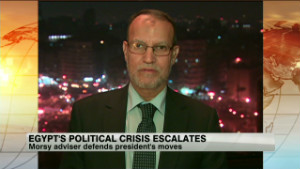 Egypt's crisis over within 15 days?
Egypt's crisis over within 15 days?  Making sense of Egypt's political crisis
Making sense of Egypt's political crisis  Sign of the times in Egypt
Sign of the times in Egypt Morsy's Muslim Brotherhood party pushed through the 234-article draft in just 21 hours from Thursday into Friday. Frustrated Coptic Christians and liberals earlier had walked out, complaining their views were not getting enough consideration.
Members voted on each article separately, discussed objections by dissenters and made alterations.
Business owner Shahira Kamel, who joined thousands of protesters in Tahrir Square, was upset with the draft.
"This is not the right constitution for our country," Kamel said. "I'm not going to change myself or my life. I have all the freedom in the world."
Opinion: Don't blame Muslim Brotherhood for Morsy power grab
A quick glimpse at the articles show that the language deals with individuals' civil rights, particularly how security forces and the justice system treats them. There's wording that prohibits arbitrary arrest and detention and ensures due process, a sensitive topic in Egypt. Mubarak and his loyalists are blamed for jailing and harshly mistreating innocents in the years before and especially during last year's uprising.
Anyone jailed cannot be interrogated without an attorney present, and if detainees don't have one, the judicial system must appoint one, one article stipulates, and phone conversations, electronic correspondence and other communication cannot be tapped without a warrant.
Friday morning, the assembly's head, Hossam al-Ghiriyani, asked if everyone agreed to the 234 articles. After a show of hands, he said, "Agreement by consensus. May God bless you." The room broke into applause, and everyone stood while the national anthem played.
Protesters to Morsy: Roll back your decree or leave
While the articles sound democratic, the fine print indicates otherwise, some independent rights experts say.
"Moving a flawed and contradictory draft to a vote is not the right way to guarantee fundamental rights or to promote respect for the rule of law," said Joe Stork, deputy Middle East and North Africa director at Human Rights Watch.
He told CNN on Friday that key rights are ignored in the draft.
"It guarantees 'freedom of expression,' but you cannot insult the Prophet. You cannot defame the Prophet," Stork said.
While it might be all right for such action to be considered a civil offense, it should not be "a criminal one as this document suggests," he said.
The draft addresses freedom of religion, Stork notes, "but you have to be a Christian, Jew (or) Muslim."
It doesn't address the Baha'is, he said, a group that has been persecuted in various countries for their faith.
Opinion: A new Egypt must learn political compromise
Other observers were more optimistic.
"The draft constitution will end the state of political division, because it will cancel the constitutional decrees that the president issued," said Dawood Basil, a Cairo University constitutional law expert. "I feel overwhelming joy after hearing the final wording of the articles."
Gehad El-Haddad, senior adviser to the Muslim Brotherhood, said the constitution, while vague in some places, largely received strong support in the assembly.
"At the end of the day, this constitution has a fairly strong representation of the Egyptian society," he told CNN.
Some critics argue the constitution could move Egypt closer to Sharia law. Mohamed Naeem, a member of the Eyptian Social Democratic Party, said it opens the way for a theocracy.
A 1971 constitution in place under Mubarak was "more open and protective of individual rights," said Mustapha Kamel Sayed, a professor of political science at Cairo University.
The preamble includes language pertaining to women, stating that they are equal to men but also accentuating their role as mothers.
The constitution says: "There is no dignity for a nation which does not honor women; women and men are equal, for they are the fort of motherhood, half of the society and partners in all the gains and national responsibilities."
Citing the family as "the foundation of society," the document guarantees free maternal health care and promises to reconcile "a woman's duties toward her family" and her job.
But Heba Morayef, the Egypt director for Human Rights Watch, argued that the language regarding women is too vague. She worries that the mention of women's family role will trump other freedoms.
The United Nations' high commissioner for human rights, Navi Pillay, urged Morsy to reconsider the draft, saying a number of measures contained in it are incompatible with international human rights law. She called them "not yet sufficient."
Many people in Egypt doubt the draft will bring them the freedoms they fought so hard for last year.
Tens of thousands of protesters Friday packed Tahrir Square, the epicenter of 2011's revolution. They prayed and listened to a cleric call Morsy a "pharaoh." Women in the crowd spoke of their concerns.
Businesswoman Faten Khalil said people don't trust the government and want Morsy to step down.
"They use religion to push us to do whatever they want but they are not really religious," she said.
Another Tahrir protester, designer Basna Azmi, criticized the Muslim Brotherhood, saying it is more an international organization than an Egyptian one.
Demonstrations have become violent at times, and protesters pitched a tent city at a traffic roundabout. Food vendors have set up stands in the middle of the street and protest leaders have walked across a sound stage leading chants.
Opposition factions have called for another mass demonstration in Tahrir Square starting near daybreak Saturday.
The Muslim Brotherhood has called for its own demonstration outside Cairo University on Saturday, in what would be the biggest public show of support for Morsy.
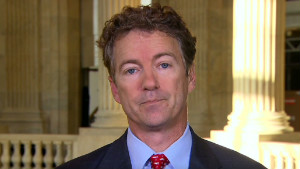 Sen. Rand Paul: Cut military spending
Sen. Rand Paul: Cut military spending 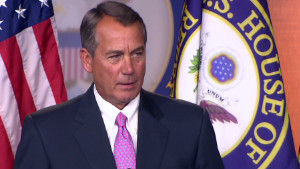 Boehner: 'There's a stalemate'
Boehner: 'There's a stalemate' 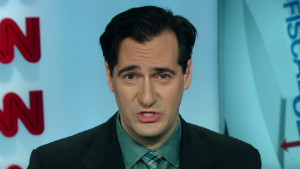 Fiscal cliff could harm schools
Fiscal cliff could harm schools 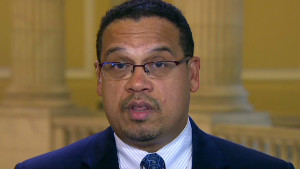 Ellison won't hurt interests of poor
Ellison won't hurt interests of poor 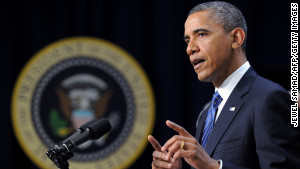 Matalin: Obama's proposal despicable
Matalin: Obama's proposal despicable  Medical marijuana for a 7-year-old?
Medical marijuana for a 7-year-old?  Dr. Gupta on medical marijuana
Dr. Gupta on medical marijuana  Marijuana's highs and lows
Marijuana's highs and lows  Rare report: CNN crew inside Syria
Rare report: CNN crew inside Syria  Former Syrian pilot speaks out
Former Syrian pilot speaks out  Twin car bombs kill dozens in Syria
Twin car bombs kill dozens in Syria  Syrian opposition claims to down jet
Syrian opposition claims to down jet  Ramallah celebrates U.N. vote
Ramallah celebrates U.N. vote 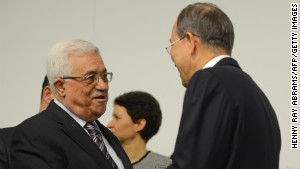 Abbas slams Israel, seeks status upgrade
Abbas slams Israel, seeks status upgrade 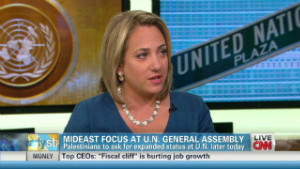 Mideast Focus at U.N. General Assembly
Mideast Focus at U.N. General Assembly